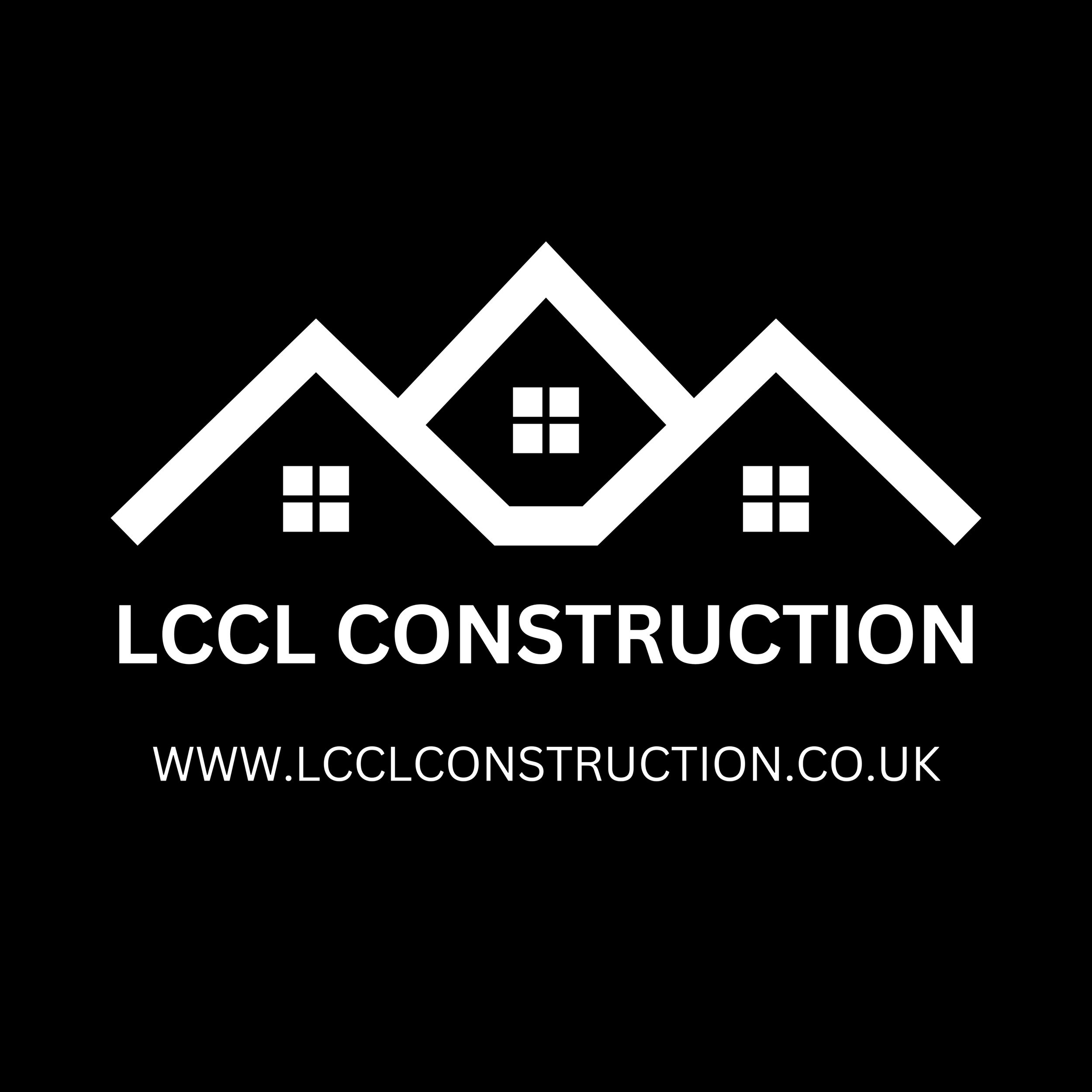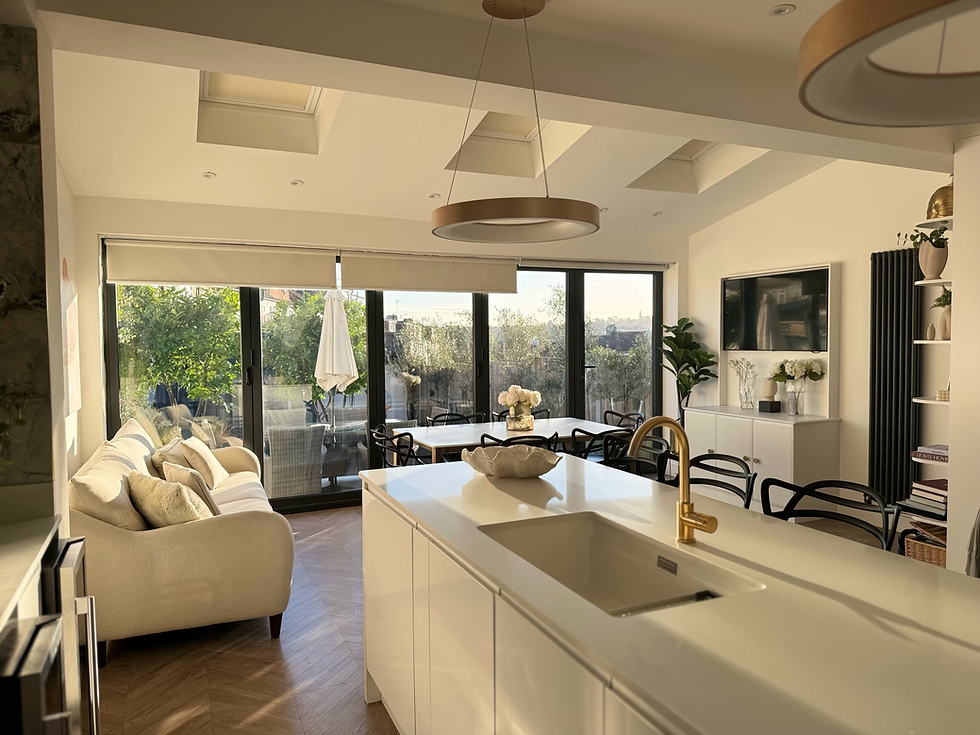Rear house extension and side extension
- Lccl Construction

- Feb 7, 2024
- 7 min read
Updated: Mar 16, 2024
Everything you need to know about completing a combined rear house extension and side extension on your home, including types of rear house extension and side extension, cost of a rear and side extension, planning rules and potential benefits of completing this type of project and what to consider before starting the project.

What is a rear house extension and side extension?
Although a side and rear house extension can be built concurrently they are essentially two separate extensions one to the side of the house and one to the rear. Similar in additional new space to a wraparound extension the key difference is that they are not connected outside of the footprint of the original house, where with a wraparound you would get an L-shaped construction around the ground floor of the house with a side and rear extension the corner that connects them would be absent.
Depending on the type of property you own and the objective of your build there are numerous different combinations of side and rear extension to choose from. Whether your aim is to add kitchen space, a home office or bedroom space there are multiple configuration options available to achieve this.
What are the benefits of a side and rear house extension?
Whether your aim is to increase the kitchen, making space for a large open plan modern kitchen and living area, create additional bedrooms upstairs, add living space, a utility room or create a boot-ility, the advantages of a side and rear extension are numerous:
Create space for a large open plan kitchen diner and casual living space where everyone can spend time together
Space for extra bedroom(s) and bathroom(s)
Add a new home office room for home working days away from the noise of family life
Extra storage space for everything from coats and shoes to laptops paperwork and pet supplies
Utilise unused space to increase the size of the home.
Improved saturation of natural light in the downstairs areas through addition of skylights/lanterns
More space to optimise the layout of the home to suit your needs
A generously sized utility room can be added to free up space in the kitchen and reduce noise from washing machines/dryers
Add a boot room to reduce dirt and clutter coming into the house
A new patio at the rear or private courtyard can be created at the side
Extra 30m2 to 100m2 of additional space (dependent on size and type of house and local planning restrictions)
Potential for additional space to be added to the first floor too in suitable properties
Extra storage and usable space for everyone in the home to enjoy

What type of space can I add to my home?
There are numerous layout options to choose from for homeowners looking to add a side extension and rear extension to their home. Several factors come into play when settling on the final layout
The size and layout of the existing home
If you are hoping to build single storey or double storey extensions, or part single part two storey
Whether you want to make moderate or substantial adjustments to the structure of the existing house or alternatively add space with minimal structural and or layout alterations to the existing house
What the use of the new rooms will be
How much budget you have available for the project
If you are looking to achieve an open plan layout/partially open plan or to add multiple rooms
The proximity of the extensions to neighboring properties and intended height of the extensions
Permitted development rights granted to the homeowner or local planning restrictions that may apply

Do I need planning permission for my side and rear house Extension?
In many cases it is possible to build a side and rear house extension as a permitted development project, subject to specific criteria being met. This is not always the case though depending on the size and scale of the extension and in some cases a full planning application will need to be made to your local planning authority. At LCCL Construction our expert team will be able to help guide you through the process.
Rules, known as ‘permitted development’ rights, allow you to extend a house without needing to apply for planning permission if specific limitations and conditions are met.
For all extensions:
Only half the area of land around the "original house"* can be covered by extensions or other buildings.
Extensions cannot be higher than the highest part of the existing roof; or higher at the eaves than the existing eaves.
Where the extension comes within two metres of the boundary* the height at the eaves cannot exceed three metres.
Extension cannot be built forward of the ‘principal elevation’ or, where it fronts a highway, the ‘side elevation’.
The work cannot include:
verandas, balconies or raised platforms.
a microwave antenna (e.g. TV aerial or satellite dish).
a chimney, flue or soil and vent pipe.
any alteration to the roof of the existing house.
On Article 2(3) designated land* the work cannot include cladding of the exterior.
The materials used in any exterior work must be of a similar appearance to those on the exterior of the existing house.
For single storey extensions:
Single-storey rear extensions cannot extend beyond the rear wall of the original house* by more than four metres if a detached house; or more than three metres for any other house.
Where not on Article 2(3) designated land* or a Site of Special Scientific Interest; and subject to ‘prior approval’, the limit for single-storey rear extensions is increased to eight metres if a detached house; or six metres for any other house.
This requires that the relevant Local Planning Authority is informed of the proposed work via a prior approval application.
Single-storey rear extensions cannot exceed four metres in height.
For Extensions more then one storey:
Extensions of more than one storey must not extend beyond the rear wall of the original house* by more than three metres or be within seven metres of any boundary* opposite the rear wall of the house.
Roof pitch must match existing house as far as practicable (note that this also applies to any upper storey built on an existing extension).
Any upper-floor window located in a ‘side elevation’ must be obscure-glazed; and non-opening (unless the openable part is more than 1.7 metres above the floor).
All side extensions of more than one storey will require householder planning permission.
On Article 2(3) designated land* all rear extensions of more than one storey will require householder planning permission.
What are the types of side and rear house extension?
Single storey side and rear extension
A ground floor extension is built and the rear of the house and to the side another ground floor extension is constructed. This would typically allow for a large open plan living/kitchen area at the back, a utility room and home office at the side. Alternatively some homeowners use the side extension as an extra en-suite bedroom.
Double storey side and rear extension
A two storey side extension is built up to the side of the property and an additional two storey rear extension is constructed at the back of the house. Typically this would mean that an extra bedroom and bathroom could be added upstairs and a large open plan kitchen and utility plus office could be added downstairs.
Double storey side extension single storey rear extension
A two storey extension is added to the side of the property and a ground floor extension is added to the rear of the property. This type of project would add bedroom and bathroom space to the first floor and accommodate a large kicthen/living space on the ground floor to the rear as well as utuility and study space to the side.
Double storey rear extension single storey side extension
A two storey extension is constructed at the rear of the property and a single storey extension is built to the side of the property. A bedroom and/or bathroom can be added to the first floor at the rear of the property, with large kitchen/living space underneath. A single storey extension to the side could house utility/home office space or an additional living room.
Integrated garage conversion and single storey rear extension
A ground floor extension is built to the rear of the property to house the kitchen/dining space. The existing garage is altered to be converted into habitable living space to become an extra living room or utility and home office.
Do I need a Party Wall Agreement for my side and rear house Extension?
For the majority of homeowners in London who are living in terraced or semi-detached properties a Party Wall Agreement will be required to carry out the work required to build a kitchen extension. The way in which the Party Wall Matters are resolved will be largely influenced by the responses received from your neighbours when the initial letter is sent, so bare that in mind in the run up to the build! For detached properties a Party Wall Agreement may be required depending on how close to the boundary you intend to build.
What is the cost of a side and rear house extension?
You can use our "instant quote calculator" and find out the cost in seconds! for both design and build, architecture services or just construction services depend what stage you are in and what you have so far completed.
We have experience of over 17 years in design and construction of loft conversions and home extensions in London and Hertfordshire areas and have worked out a unique calculation formula that you can find out to what your house extension and loft conversion will cost in seconds.
How much value will a side and rear extension add to my house?
Whilst the potential gain may vary across regions and there are other factors to consider such as the size and layout, size and location of the existing house, research conducted by Nationwide https://www.nationwidehousepriceindex.co.uk/reports/dwd on the increase in value gained by building an extension found that an average 3 bedroom house could enjoy an increase in value of up to 25% by adding an extension.
Is my house suitable for a side and rear extension?
Side and rear extensions can be created on end of terraced houses, semi detached houses or detached houses including Period style properties, Edwardian, Victorian or modern homes that have space to the side of the existing ground floor.
How can Lccl Construction be of help?
Do you require a loft conversion and house extension to add extra space?
Do you require architecture design and construction services?
Then look no further get in touch with us for a detailed free no obligation quote. We can accommodate a very quick turnaround. Our loft conversions and house extensions come with 10 year guarantee and 12 month workmanship guarantee.
Use our instant quote calculator for a quote about your project whether construction only or design and build.
Use our Free consultation call booking system to schedule a call at the time and date that suits you best.
Telephone: 020 8037 7332
Email: info@lcclconstruction.co.uk
Free consultation call: https://www.lcclconstruction.co.uk/book-online
Instant quote online: https://www.lcclconstruction.co.uk/instant-quote
How does it work? https://www.lcclconstruction.co.uk/how-does-it-work





